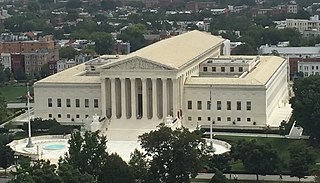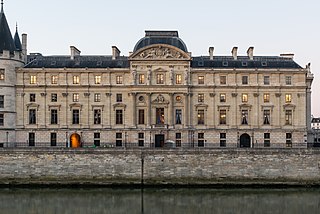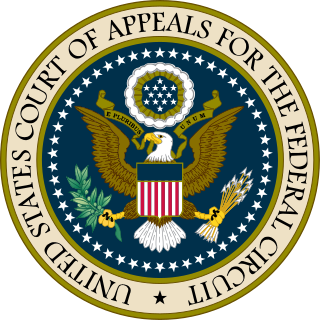An appeal is the process in law by which cases are reviewed and parties request a formal change to an official decision.
Contents
Appeal may also refer to:
An appeal is the process in law by which cases are reviewed and parties request a formal change to an official decision.
Appeal may also refer to:

United States appellate procedure involves the rules and regulations for filing appeals in state courts and federal courts. The nature of an appeal can vary greatly depending on the type of case and the rules of the court in the jurisdiction where the case was prosecuted. There are many types of standard of review for appeals, such as de novo and abuse of discretion. However, most appeals begin when a party files a petition for review to a higher court for the purpose of overturning the lower court's decision.

A court of appeals, also called a court of appeal, appellate court, appeal court, court of second instance or second instance court, is any court of law that is empowered to hear an appeal of a trial court or other lower tribunal. In much of the world, court systems are divided into at least three levels: the trial court, which initially hears cases and reviews evidence and testimony to determine the facts of the case; at least one intermediate appellate court; and a supreme court which primarily reviews the decisions of the intermediate courts, often on a discretionary basis. A particular court system's supreme court is its highest appellate court. Appellate courts nationwide can operate under varying rules.
Jurisdiction is the legal term for the legal authority granted to a legal entity to enact justice. In federations like the United States, areas of jurisdiction apply to local, state, and federal levels.
In the United States, a state supreme court is the highest court in the state judiciary of a U.S. state. On matters of state law, the judgment of a state supreme court is considered final and binding in both state and federal courts.

The United States courts of appeals are the intermediate appellate courts of the United States federal judiciary. The courts of appeals are divided into 11 numbered circuits that cover geographic areas of the United States and hear appeals from the U.S. district courts within their borders, the District of Columbia Circuit, which covers only Washington, D.C., and the Federal Circuit, which hears appeals from federal courts across the United States in cases involving certain specialized areas of law. The courts of appeals also hear appeals from some administrative agency decisions and rulemaking, with by far the largest share of these cases heard by the D.C. Circuit. Appeals from decisions of the courts of appeals can be taken to the U.S. Supreme Court.
In cricket, an umpire is a person who has the authority to make decisions about events on the cricket field according to the Laws of Cricket. Besides making decisions about legality of delivery, appeals for wickets and general conduct of the Game in a legal manner, the umpire also keeps a record of the deliveries and announces the completion of an over.

The Court of Cassation is one of the four courts of last resort in France. It has jurisdiction over all civil and criminal matters triable in the judicial system; it is the supreme court of appeal in these cases. It has jurisdiction to review the law, as well as to certify questions of law, to determine miscarriages of justice. The Court is located in the Palace of Justice in the 1st arrondissement of Paris.

The Appellate Divisions of the Supreme Court of the State of New York are the intermediate appellate courts in New York State. There are four Appellate Divisions, one in each of the state's four Judicial Departments.

The United States Court of Appeals for the Federal Circuit is a United States court of appeals that has special appellate jurisdiction over certain types of specialized cases in the U.S. federal court system. It has exclusive appellate jurisdiction over all U.S. federal cases involving patents, trademarks, government contracts, veterans' benefits, public safety officers' benefits, federal employees' benefits, and various other categories. Unlike other federal courts, the Federal Circuit has no jurisdiction over cases involving criminal, bankruptcy, immigration, or U.S. state law.
WACA may refer to:

The Supreme Court of Tasmania is the highest State court in the Australian State of Tasmania. In the Australian court hierarchy, the Supreme Court of Tasmania is in the middle level, with both an appellate jurisdiction over lower courts, and decisions made by Court to be heard on appeal by the High Court of Australia.

The Court of Appeal of New Zealand is the principal intermediate appellate court of New Zealand. It is also the final appellate court for a number of matters. In practice, most appeals are resolved at this intermediate appellate level, rather than in the Supreme Court. The Court of Appeal has existed as a separate court since 1862 but, until 1957, it was composed of judges of the High Court sitting periodically in panels. In 1957 the Court of Appeal was reconstituted as a permanent court separate from the High Court. It is located in Wellington.

A supreme court is the highest court within the hierarchy of courts in most legal jurisdictions. Other descriptions for such courts include court of last resort, apex court, and highcourt of appeal. Broadly speaking, the decisions of a supreme court are not subject to further review by any other court. Supreme courts typically function primarily as appellate courts, hearing appeals from decisions of lower trial courts, or from intermediate-level appellate courts.
Court of Criminal Appeal may refer to:

The current judiciary of Niger was established with the creation of the Fourth Republic in 1999. The constitution of December 1992 was revised by national referendum on 12 May 1996 and, again, by referendum, revised to the current version on 18 July 1999. It is an inquisitorial system based on the Napoleonic Code, established in Niger during French colonial rule and the 1960 constitution of Niger. The Court of Appeals reviews questions of fact and law, while the Supreme Court reviews application of the law and constitutional questions. The High Court of Justice (HCJ) deals with cases involving senior government officials. The justice system also includes civil criminal courts, customary courts, traditional mediation, and a military court. The military court provides the same rights as civil criminal courts; however, customary courts do not. The military court cannot try civilians.

The Judiciary of Barbados is an independent branch of the Barbadian government, subject only to the Barbadian Constitution. It is headed by the Chief Justice of Barbados. Barbados is a common law jurisdiction, in which precedents from English law and British Commonwealth tradition may be taken into account.
In law, an appeal is the process in which cases are reviewed by a higher authority, where parties request a formal change to an official decision. Appeals function both as a process for error correction as well as a process of clarifying and interpreting law. Although appellate courts have existed for thousands of years, common law countries did not incorporate an affirmative right to appeal into their jurisprudence until the 19th century.
Khalid Mahmood may refer to:
The judiciary of the Philippines consists of the Supreme Court, which is established in the Constitution, and three levels of lower courts, which are established through law by the Congress of the Philippines. The Supreme Court has expansive powers, able to overrule political and administrative decisions, and with the ability to craft rules and law without precedent. It further determines the rules of procedure for lower courts, and its members sit on electoral tribunals.

The judiciary of South Korea is the judicial branch of South Korean central government, established by Chapter 5 and 6 of the Constitution of South Korea.